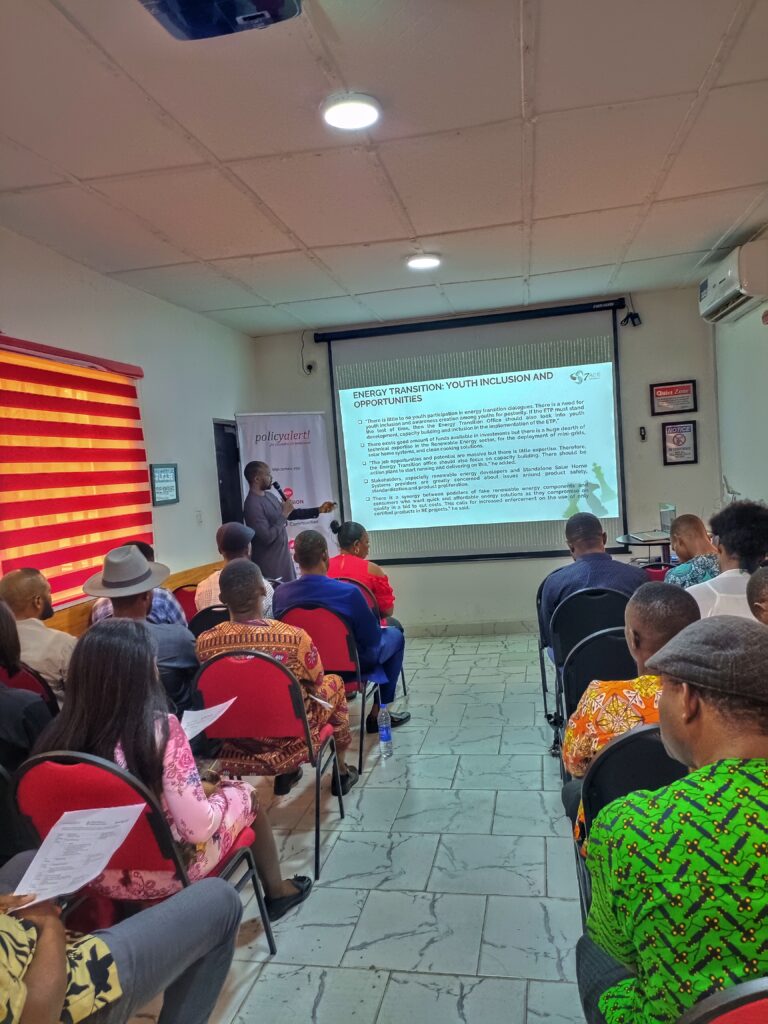_By Lucy Eyo
Young people have a critical role to play across many aspects of climate policy and the energy transition. In recognition of this role, Policy Alert, BudgIT Foundation, and the Natural Resources Governance Institute (NRGI) recently convened two events that brought together youth representatives from oil and gas-producing communities, youth-led organizations, climate advocacy organizations, and renewable energy start-ups to reflect on their role in the country’s energy transition.

The first was an in-person town hall meeting for young people from three oil and gas communities in the Niger Delta to discuss what the energy transition means to them. The second, a webinar, was a robust inter-generational conversation on Nigeria’s energy future between a cross-section of youth climate and clean energy advocates and some government, corporate, and civil society leaders, culminating in the public presentation of Youth Voices 2060, the biggest youth movement engaging the energy transition in Africa.

Some of what we learned during the events:
- Nigeria holds the bragging rights to the world’s biggest youth cohort compared to the population (70 percent of Nigeria’s population is under 30) and the world’s largest energy deficit. In the context of the global energy transition, this contradiction offers a demographic opportunity to transform the country’s energy system in clean and sustainable ways that can benefit both young people and society in general.
- Nigeria has set a 2060 target for decarbonization, yet young people who form a bulk of the country’s population and have a greater stake in that future are not sufficiently involved in the planning and actions around climate change mitigation and the Energy Transition Plan (ETP). Youth are a potential force for energizing the transition, and this potential can only be translated to reality if they have a meaningful voice in the spaces where decisions are made that can impact the transition. This suggests the need for a review of the ETP and other decarbonization policies and legal frameworks from a youth-responsive perspective.
- A clean energy future will require a whole new set of skills, different from those on which the fossil energy system depends. Preparing young people for that future means that governments at all levels in Nigeria must begin to invest massively in renewable energy skills for youth. The 2023 edition of IRENA’s Renewable Energy and Jobs: Annual Review emphasizes that for the energy transition to be just, education and training programs must be expanded to prevent the widening of skill gaps and that such measures must be deliberate about the representation of youth and other minorities.
- Nigeria’s oil-based economy will have to deal with serious shocks arising from the global transition away from fossil-based energy systems, but oil-producing subnational economies will have a lot more to lose given their current disproportionate exposure to derivation receipts from fossil fuel production. To prevent a lock-in effect, governments of oil-producing states must begin now to reinvest oil derivation payments into other revenue-generating sources and in clean energy projects at the community level. Policymakers and young people from such states must also get proactively involved in energy transition decision-making at national and global levels.
- The current global energy system has left dirty and damaging footprints on fence-line communities in energy-exporting countries, such as those in Nigeria’s Niger Delta. As the world transitions away from dirty energy, the question is increasingly being asked about what plans there are to responsibly decommission oil and gas facilities, clean up these communities, and rescue their young people from the social and economic collapse that fossil fuel production has created. Justice for the youth of these communities is an important precondition for a just energy transition.
- Young people have the advantage of passion and innovation which can be deployed to lead advocacy initiatives, renewable energy businesses, local energy communities, or community-based energy projects. In this digital age, young people are comparatively advantaged to leverage their influence to build public awareness around energy challenges and galvanize support for climate and energy policies.
One of the youth leaders who spoke at the second event, Chizoba Nzeakor of The Zoba Advisory, put it this way: “The inclusion of diverse voices fosters a more resilient and adaptable energy strategy, one that resonates with the needs and aspirations of the younger generation who are always at the forefront of innovative solutions.”

The event closed with the adoption of priorities for action and the formation of Youth Voices 2060, a network of youth activists and youth-led organizations working to mainstream a youth perspective in Nigeria’s energy transition. Interested to be a part of this exciting network or to support its work? Join here!
